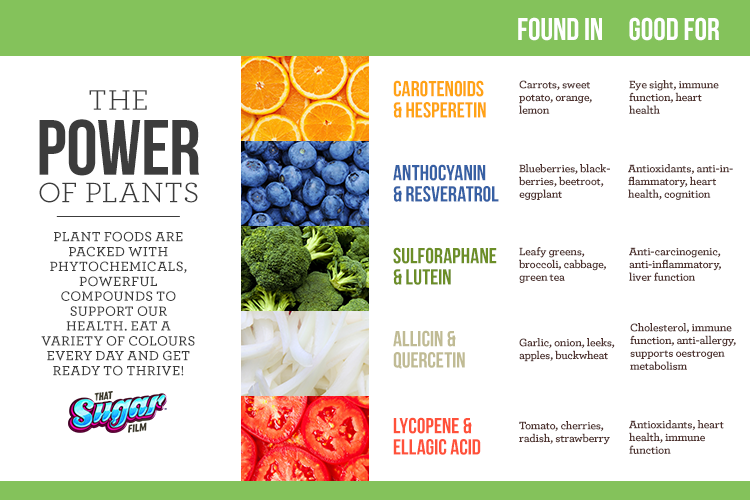Blog
The Power of Plants
 Yes we hear it all the time – eat your veg! But seriously, the goodness packed into edible plants is profound, proven by science, and here to protect you.
Yes we hear it all the time – eat your veg! But seriously, the goodness packed into edible plants is profound, proven by science, and here to protect you.
The Western diet that dominates so much of our supermarket shelves lacks the goodies rammed into fresh plant foods such as vegetables, fruit, legumes, nuts and seeds. This leads to excessive and chronic inflammation, oxidative stress, and burden on our organs.
And this could contribute to why we are enduring so much fatigue, depression, discomfort and disease.
But it doesn’t need to be that way! And you can support your health from your humble kitchen.
Plants helping you to power on
Plant foods contain powerful little dudes called phytochemicals. These are complex compounds that can have a far greater effect on boosting health than vitamins and minerals alone.
Hence why whole food is nature’s way of giving us medicine, complete in a neat package.
There are a whole variety of phytochemicals, including carotenoids, polyphenols, and bioflavonoids to name a few. Rich colour can be a good indicator of high bioavailability, and of ensuring diversity of these constituents. In fact variety is key when mitigating oxidative stress3 – so throughout the day, think about eating the rainbow!
Phytochemicals work synergistically to help us out, and have been found to boost health due their protective activity, whether in specific disease processes, or mitigating damaging effects of environmental factors such as certain foods.
Off setting damage of inflammatory foods
A study has shown that damaging compounds produced whilst cooking red meat at high temperatures can be off set when spices or herbs such as turmeric and rosemary are consumed at the same time.2
Eating your veg with a high fat meal (and to a lesser extent, a high carb meal) may actually blunt any acute negative effects on blood vessels, due to their powerful antioxidant content (in this case, tomatoes, carrots and capsicum).1 Cool!
Type 2 Diabetes
A plant predominant diet is thought to reduce incidence of Type 2 diabetes,4 largely due to the high nutrient, phytochemical and fibre content found in minimally processed whole foods. Basically, lots of veg and fruit!
Cardiovascular disease
Studies that have shown a 75% decrease in cardiovascular diseases with medications such as statin, anti-hypertensive, aspirin and supplementing folic acid. Studies have also shown a 75% in cardiovascular risk factors with consumption of vegetables, fruit, almonds, cocoa, tea, fish, garlic, and even a little wine.
I would have thought a pinot over a pill would be a little more fun, wouldn’t you?
The fabulous effect seen in wine consumption is due to the resveratrol content, a phytochemical found in the skin of red grapes. So it isn’t necessarily the booze, but grapes from whence they came.
Epigenetics – our food and our genes
On that note, something to consider in all of this is the role of genetics. Epigenetics is the effect of the environment on the expression of our genes. We have discussed previously genetics and how we are more microbial genes than our parents genetic material. That alone is a little crae crae.
How we react to foods, however, will be influenced by the diets of our predecessors. For example, soy may be great for the Japanese, and red wine a non-issue for the Italians, though not necessarily vice-versa.
Food can be considered ‘information’. When consumed, certain components (good and bad) are delivered to cells. The action and interaction of these components can affect genetic expression by turning an on or off switch, implicating gene function. Essentially, food can impact every person differently.
One size does not fit all
What we choose to eat can have a HUGE consequence on whether we live well, or whether we don’t. Nutrition is a hugely complex and varied world – more complex than most give it credit for.
Whilst there is no hard and fast dietary rule or protocol for every human to grace this earth, we can be safe to say that a diet abundant in seasonal, fresh, whole plant foods – rich with phytochemicals that are bursting to support our health – is going to be pretty darn great for us, as well as for our intestinal microbes.
And what is best is you have the power to choose healing and health with the next thing you pop into your gob. That is genuine, real deal, food as medicine.
Power to you plants, for keeping us keeping on. #plantpower
References:
- Esposito, K, Nappo, F, Giugliano, F, Giugliano, G, Marfella, R, & Giugliano, D 2003, ‘Effect of dietary antioxidants on postprandial endothelial dysfunction induced by a high-fat meal in healthy subjects’, The American Journal Of Clinical Nutrition, vol. 77, no. 1, pp. 139-143.
- Puangsombat, K, Jirapakkul, W, & Smith, JS 2011, ‘Inhibitory activity of Asian spices on heterocyclic amines formation in cooked beef patties’,Journal Of Food Science, vol. 76, no. 8, pp. T174-T180.
- Thompson, HJ, Heimendinger, J, Diker, A, O’Neill, C, Haegele, A, Meinecke, B, Wolfe, P, Sedlacek, S, Zhu, Z, & Jiang, W 2006, ‘Dietary botanical diversity affects the reduction of oxidative biomarkers in women due to high vegetable and fruit intake’, The Journal Of Nutrition, vol. 136, no. 8, pp. 2207-2212.
- Xi, P & Liu, RH 2016, ‘Whole food approach for type 2 diabetes prevention,’ Molecular Nutrition & Food Research, (Epub ahead of print).












